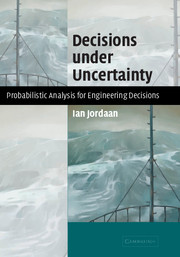Book contents
- Frontmatter
- Contents
- List of illustrations
- Preface
- Acknowledgements
- 1 Uncertainty and decision-making
- 2 The concept of probability
- 3 Probability distributions, expectation and prevision
- 4 The concept of utility
- 5 Games and optimization
- 6 Entropy
- 7 Characteristic functions, transformed and limiting distributions
- 8 Exchangeability and inference
- 9 Extremes
- 10 Risk, safety and reliability
- 11 Data and simulation
- 12 Conclusion
- Appendix 1 Common probability distributions
- Appendix 2 Mathematical aspects
- Appendix 3 Answers and comments on exercises
- References
- Index
6 - Entropy
Published online by Cambridge University Press: 05 June 2012
- Frontmatter
- Contents
- List of illustrations
- Preface
- Acknowledgements
- 1 Uncertainty and decision-making
- 2 The concept of probability
- 3 Probability distributions, expectation and prevision
- 4 The concept of utility
- 5 Games and optimization
- 6 Entropy
- 7 Characteristic functions, transformed and limiting distributions
- 8 Exchangeability and inference
- 9 Extremes
- 10 Risk, safety and reliability
- 11 Data and simulation
- 12 Conclusion
- Appendix 1 Common probability distributions
- Appendix 2 Mathematical aspects
- Appendix 3 Answers and comments on exercises
- References
- Index
Summary
Chaos umpire sits,
And by decision more embroils the fray
By which he reigns: next him high arbiter
Chance governs all.
John Milton, Paradise Lost, book ii, 1. 907Introductory comments
Entropy is a concept that is basic to the second law of thermodynamics. It has been used extensively in deriving and studying probability distributions corresponding to maximum entropy. We know that it represents, in some way, disorder, and that the entropy of the universe increases. Eddington called it ‘time's arrow’. Its roots are in the erratic development of the laws of thermodynamics over the last century and a half. Bridgman (1941) says of these laws that ‘they smell more of their human origin’ (as compared to the other laws of physics). This origin encompasses such activities as the observation by Mayer of the colour of blood of his patients in the tropics. During bleeding of these patients in Java, he noticed that the red colour of their venous blood was much brighter than that of his patients in Germany. This brightness indicated that less oxygen had been used in the processing of body fuel than in Germany. The human body, treated as a heat engine, needed less energy in the tropics since less energy was taken out by the surroundings. Mayer concluded that work and heat are equivalent. The second law is illuminated by the irreversible generation of heat during the boring of cannons using teams of horses by Count Rumford.
- Type
- Chapter
- Information
- Decisions under UncertaintyProbabilistic Analysis for Engineering Decisions, pp. 272 - 316Publisher: Cambridge University PressPrint publication year: 2005



